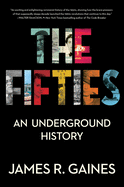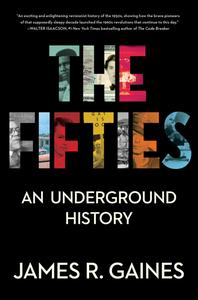
 Whenever it's time to toast pioneering American social and environmental justice warriors of the modern era, big names from the 1960s and '70s get most of the glory--and unfairly, according to James R. Gaines, former managing editor of Time magazine. He has taken valiant steps to redress this wrong in The Fifties: An Underground History, in which he painstakingly and persuasively shows how the 10 individuals he profiles fought "through the thicket of postwar repressions" to help build what would later come to be known as the gay rights, feminist, civil rights and environmental movements.
Whenever it's time to toast pioneering American social and environmental justice warriors of the modern era, big names from the 1960s and '70s get most of the glory--and unfairly, according to James R. Gaines, former managing editor of Time magazine. He has taken valiant steps to redress this wrong in The Fifties: An Underground History, in which he painstakingly and persuasively shows how the 10 individuals he profiles fought "through the thicket of postwar repressions" to help build what would later come to be known as the gay rights, feminist, civil rights and environmental movements.
The phrase "ahead of their time" gets thrown around awfully casually, but it does apply to the people that Gaines spotlights in each of his book's four themed sections. Before there was Greenpeace, Rachel Carson and Norbert Wiener were writing about the health and environmental costs of unchecked industrial and technical innovations. Before there was gay rights activist Harvey Milk, the cause had Harry Hay and Frank Kameny, who worked tirelessly to combat their day's "disease" attitude toward homosexuality. Before the 1963 publication of Betty Friedan's The Feminine Mystique launched the second wave of feminism, Pauli Murray, Gerda Lerner and Fannie Lou Hamer presaged intersectionality by recognizing how the fight against sexism shared a spirit with the fight against racism. And before Americans learned of Martin Luther King's dream, the Black GIs Isaac Woodard, Medgar Evers and Robert F. Williams battled white supremacy with an approach somewhat less pacifist than the NAACP would have liked: "To the Black veterans of World War II and in the longer history of the Black Freedom Movement," writes Gaines, "nonviolence without the support of armed resistance to racist violence amounted to surrender."
The Fifties will likely enlighten many a historian and would be a superb entry point for young adults trying to get their heads around, as Gaines puts it, "how the 1950s--a time when all telephones were black, all bathtubs were white, and very little was gray--could have led to the polychromatic riot of the 1960s." Gaines (Wit's End: Days and Nights of the Algonquin Round Table), a child of the '50s who came of age in the '60s, admits that "my generation had our moments, but looking back, I cannot help feeling that the people like those in this book were the more authentic rebels, in part because they did not think of themselves that way." Readers of The Fifties will. --Nell Beram, author and freelance writer
Shelf Talker: In this intrepid corrective, James R. Gaines shines a light on the activists, some unsung, who spent the 1950s seeding the future gay rights, feminist, civil rights and environmental movements.

